Abstract
We studied the effect of passively administered anti-carrier and anti-hapten antibodies on the primary anti-hapten antibody response to hapten—carrier conjugates in mice. Bacterial α-amylase (BαA), Taka-amylase A (TAA) and keyhole limpet haemocyanin (KLH) were used as carrier molecules, and 2,4-dinitrophenyl (DNP) group was used as a haptenic determinant.
Three groups of mice were injected intravenously with anti-carrier antiserum, anti-hapten antiserum and normal serum as the control, respectively, immediately after the immunization with the hapten—carrier conjugate.
The primary anti-carrier antibody response was markedly suppressed by the passively administered anti-carrier antibody but not anti-hapten antibody. However, the primary anti-hapten antibody response was suppressed not only by passively administered anti-hapten antibody but also by the injection of anti-carrier antibody in an early period after the immunization.
When anti-carrier antibody was given twice 0 and 7 days after immunization, the primary anti-hapten antibody response was markedly suppressed and the suppressive effect was observed even at a later period. In contrast, anti-hapten antibody given by the same schedule as above suppressed only the primary anti-hapten antibody response, but not the anti-carrier antibody response.
Passively administered anti-carrier antibody did not suppress carrier-specific helper cell development, but still suppressed the development of B memory cells and antibody formation against carrier determinants. The antigen dose required for the development of B-cell memory was much higher than that necessary for the stimulation of T cells.
Passively administered anti-carrier antibody clearly inhibited the cellular cooperation between carrier-committed helper cells and hapten-specific B cells and the augmented primary anti-hapten antibody response induced by carrier-primed T cells was clearly abolished. Furthermore, mice preimmunized with carrier showed significantly lower anti-hapten antibody response following the hapten—carrier challenge. Moreover, development of hapten-specific memory cells was also suppressed.
Thus, even in the non-specific antibody-induced suppression by anti-carrier antibody, negative feedback effect of a B-cell product with anti-carrier specificity exclusively regulates the B-cell line development and differentiation.
Full text
PDF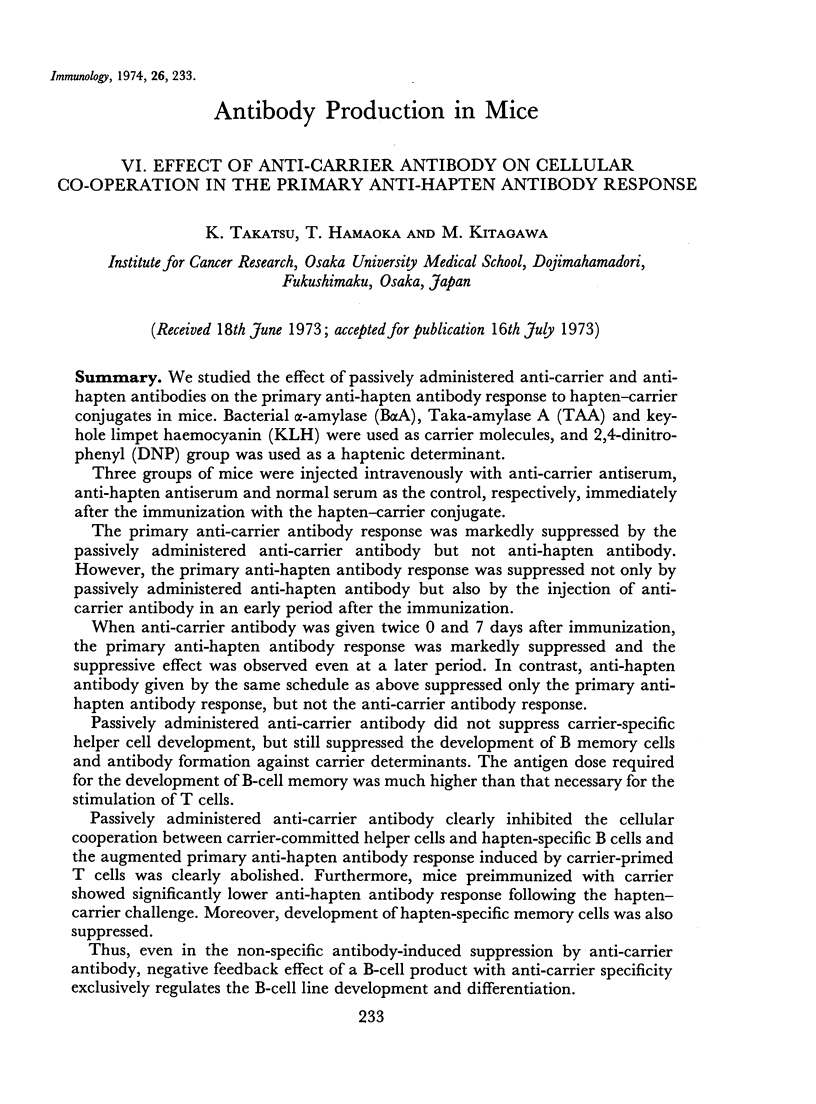
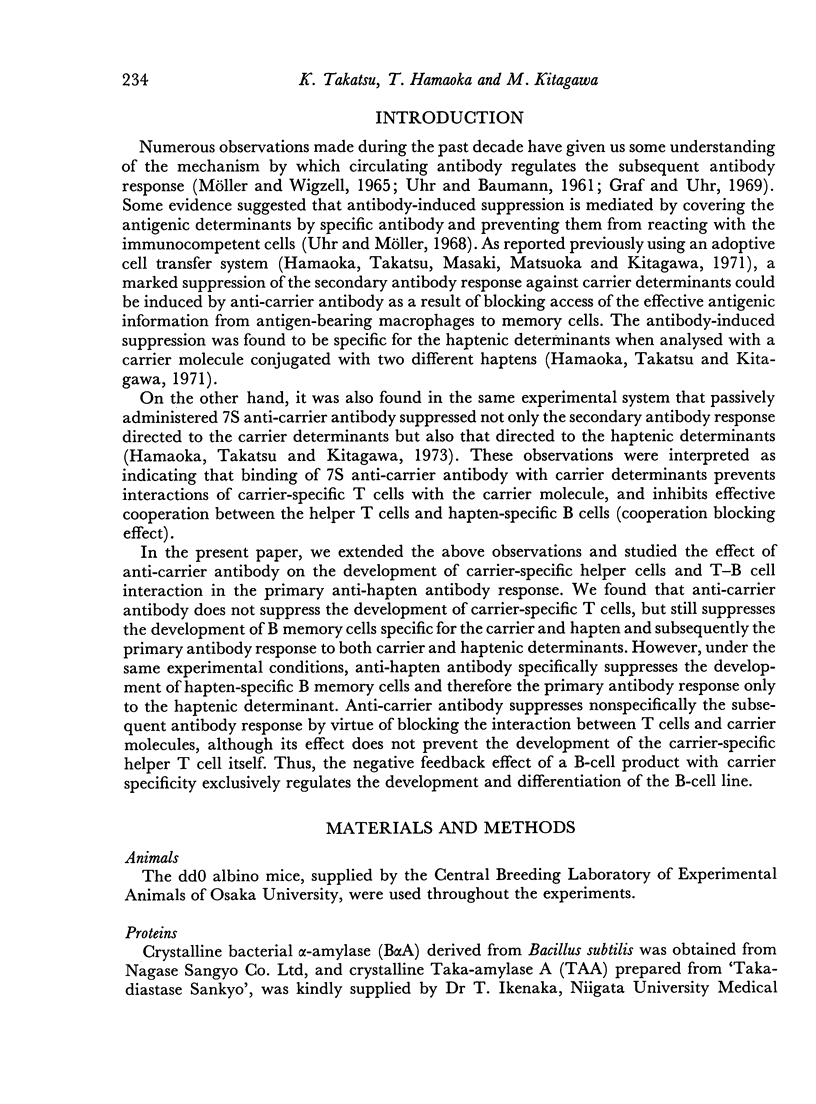
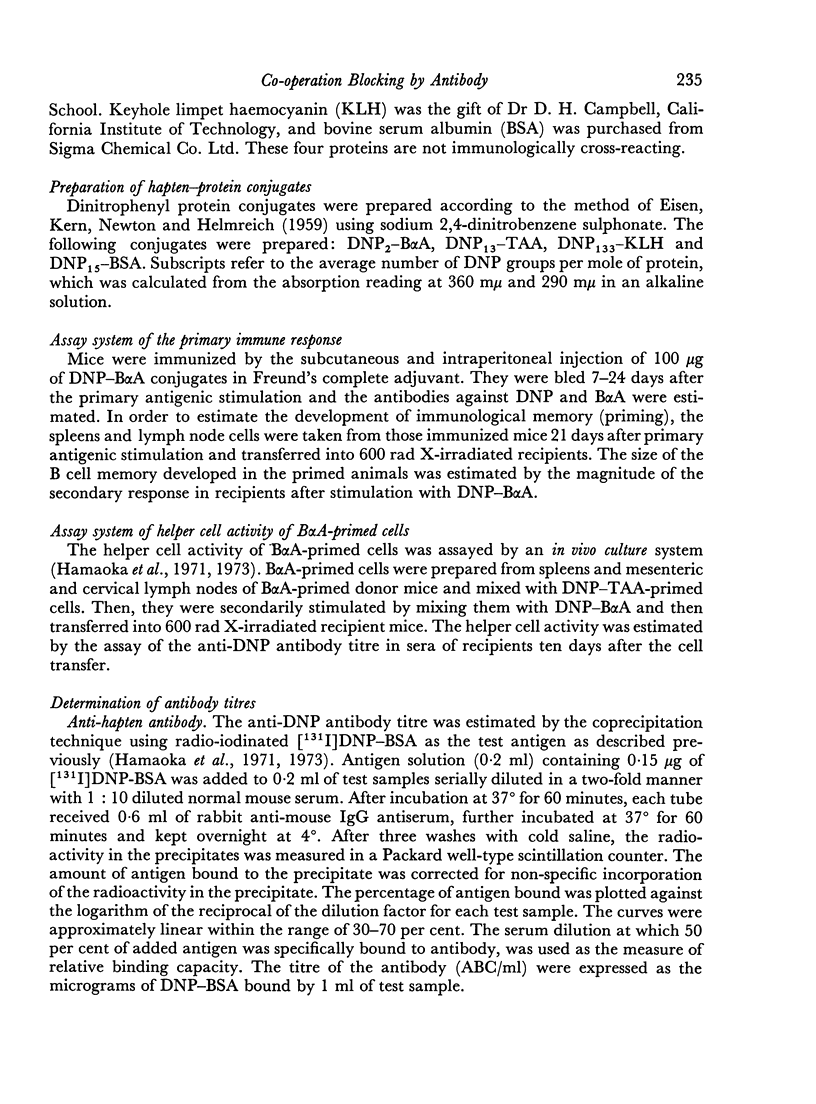
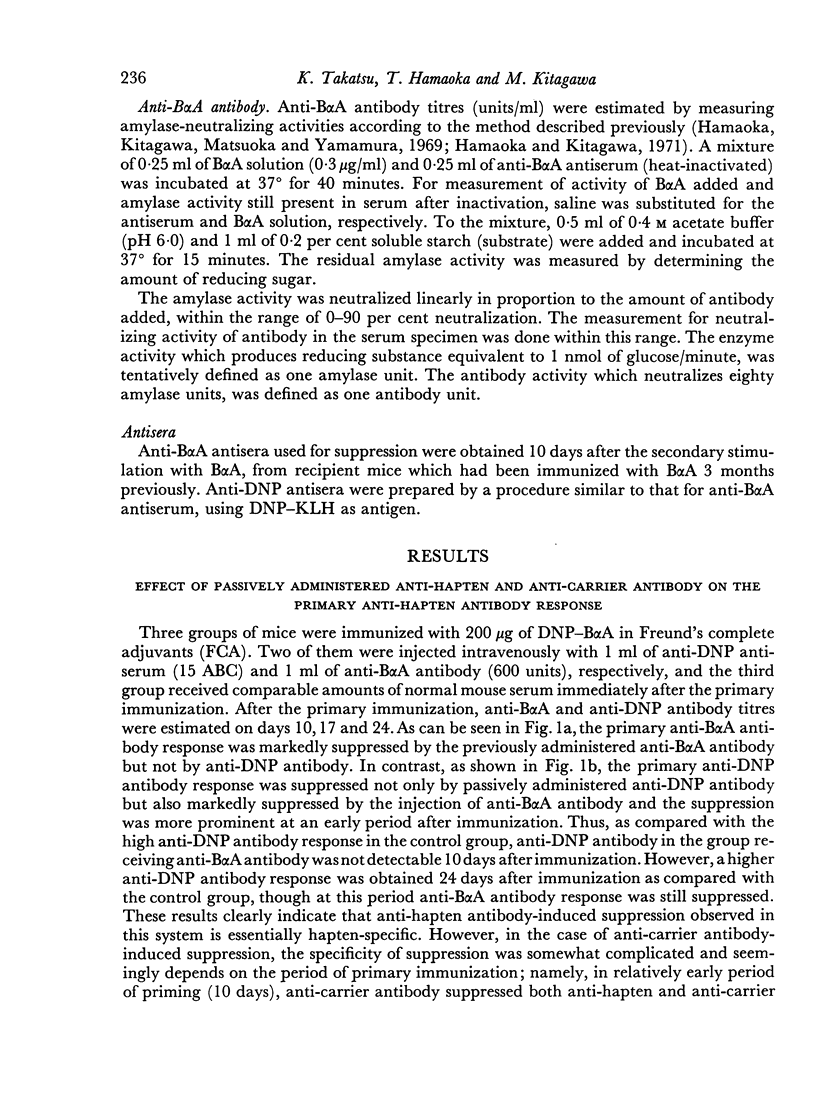
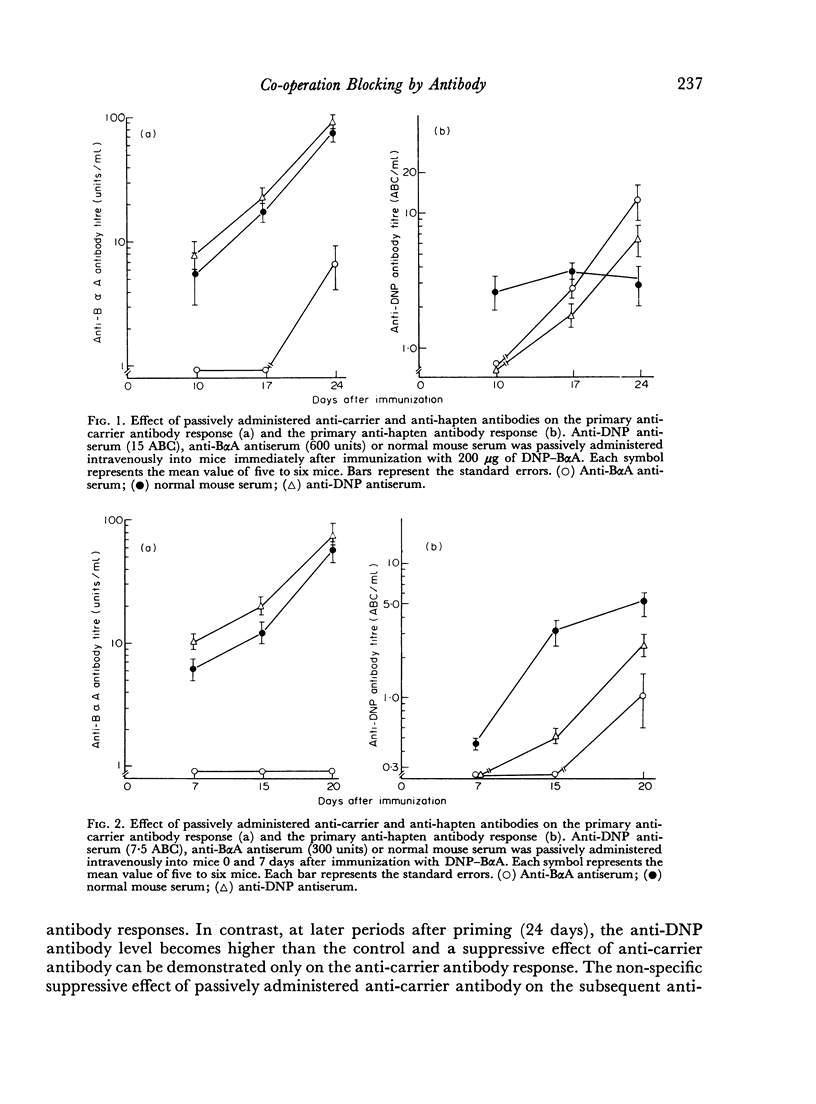
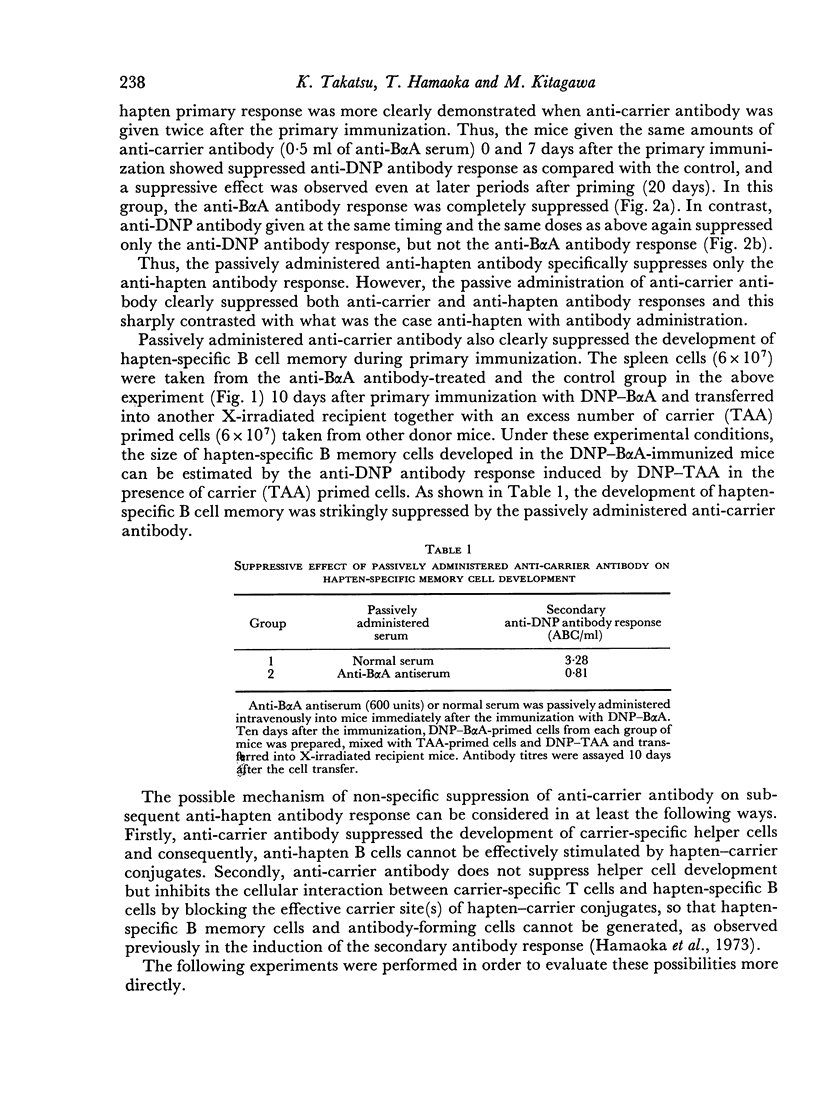
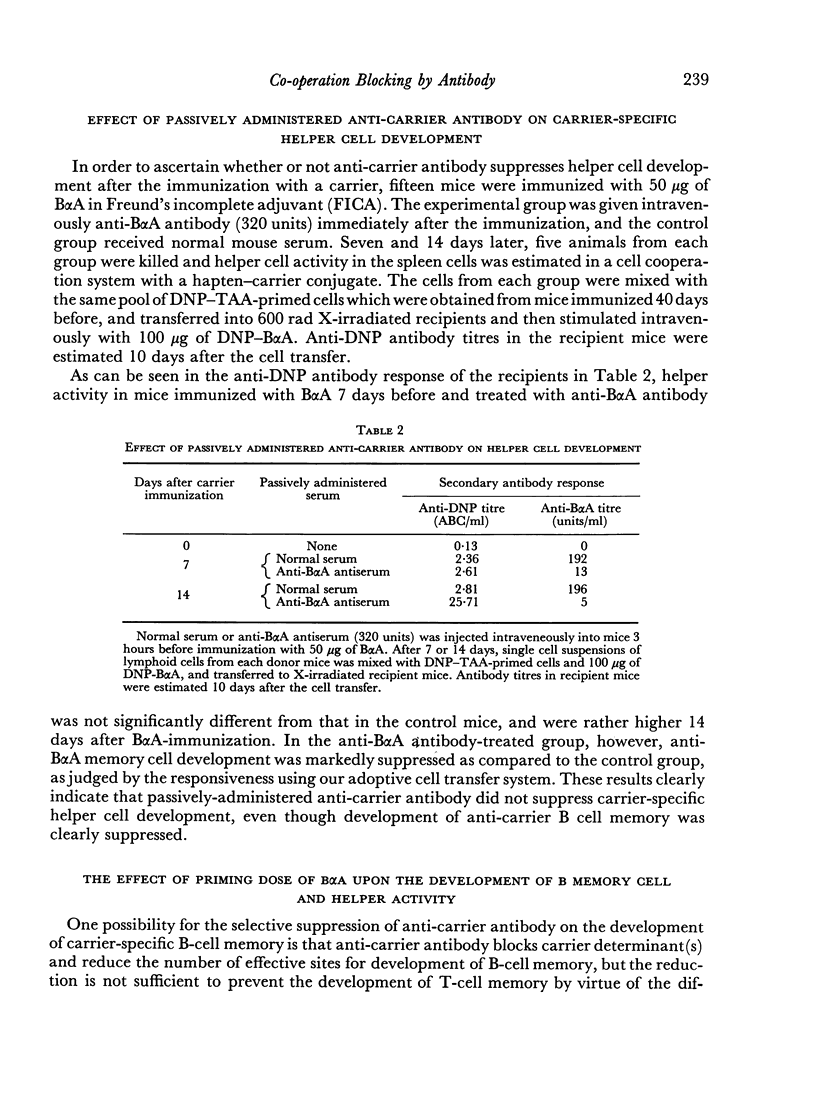
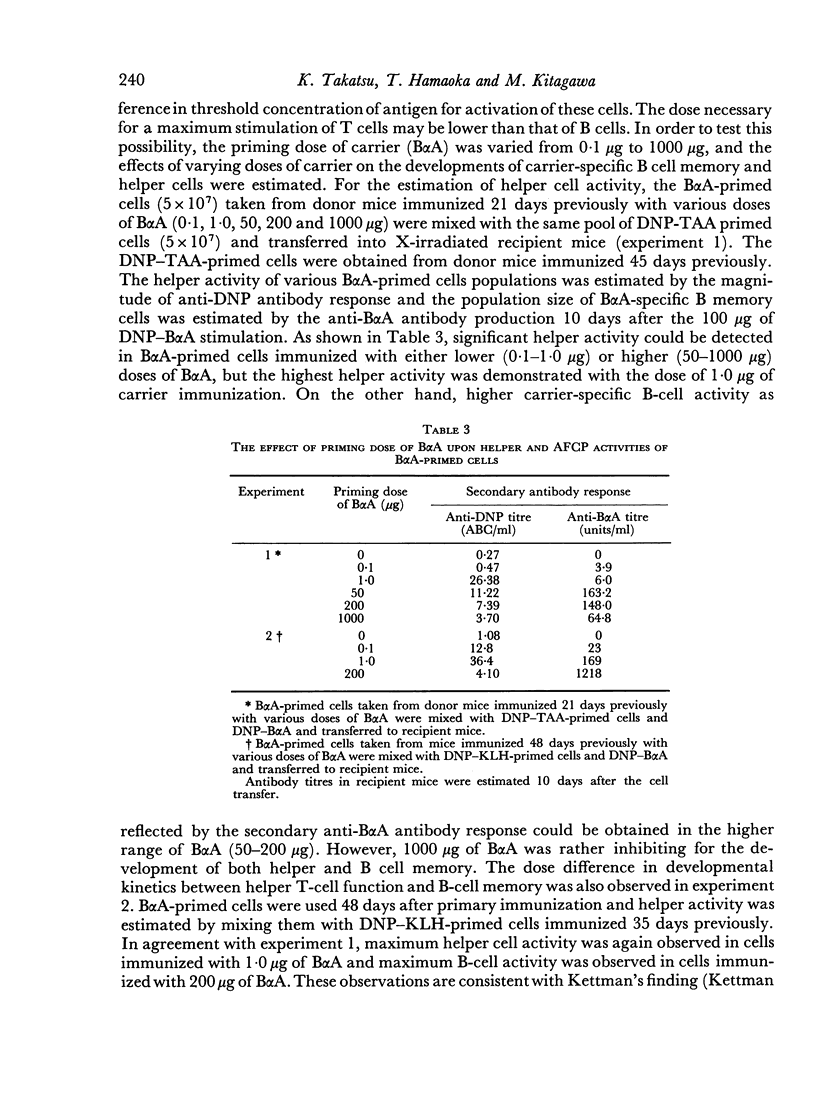
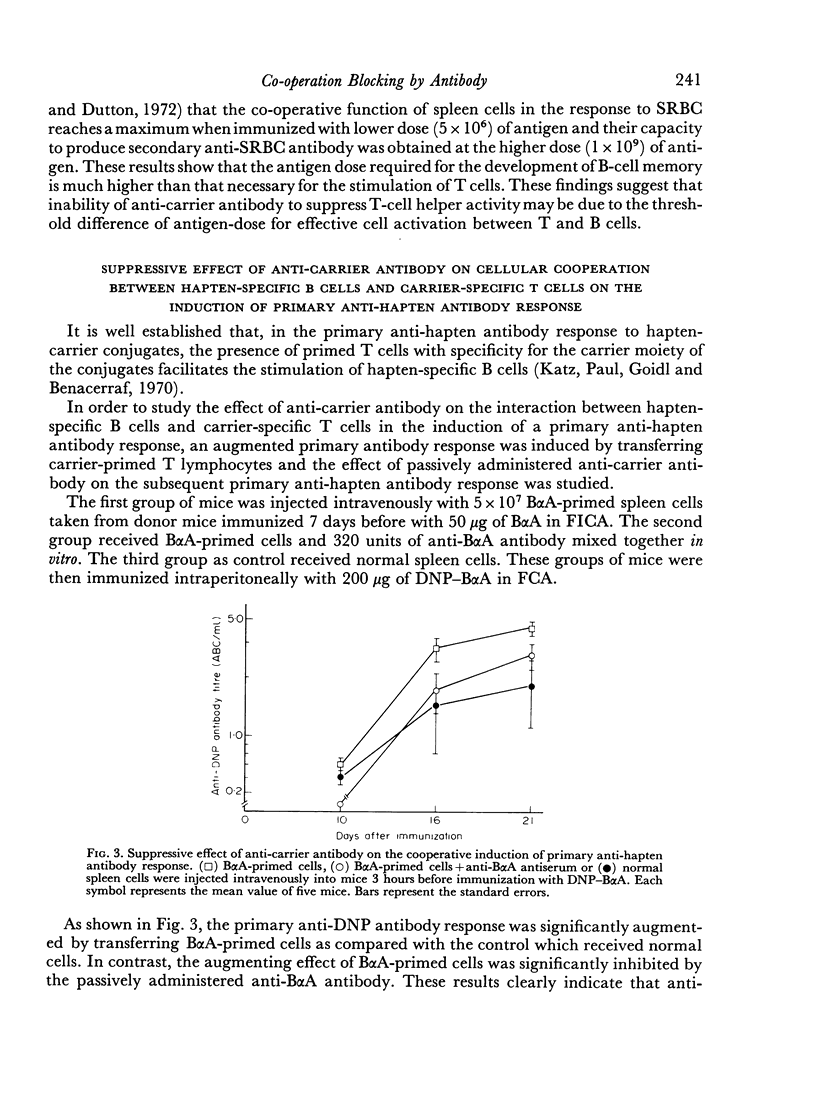
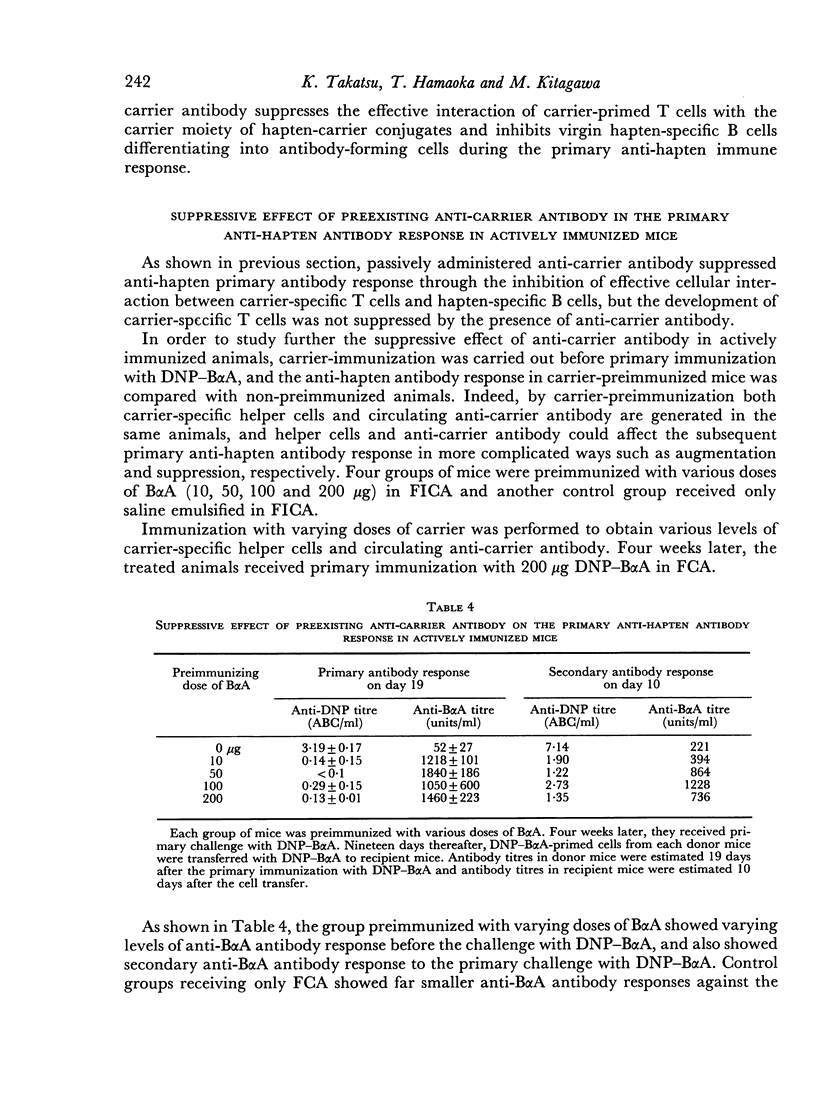
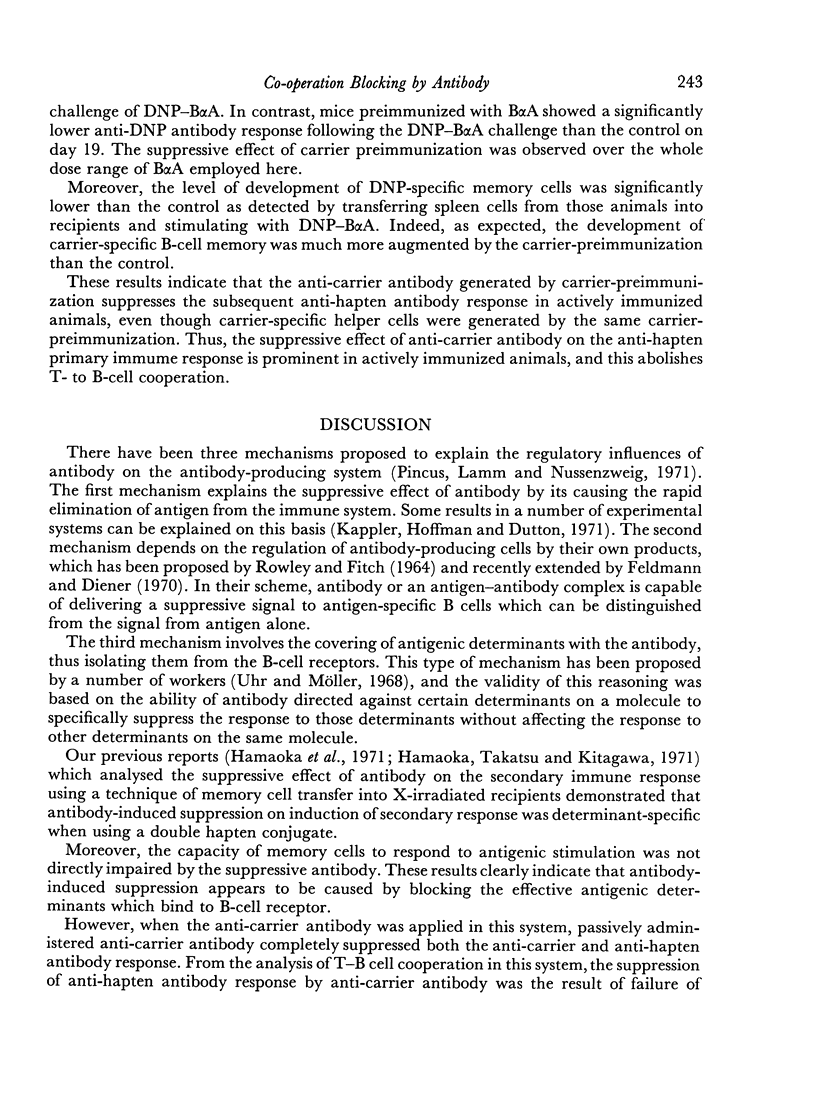
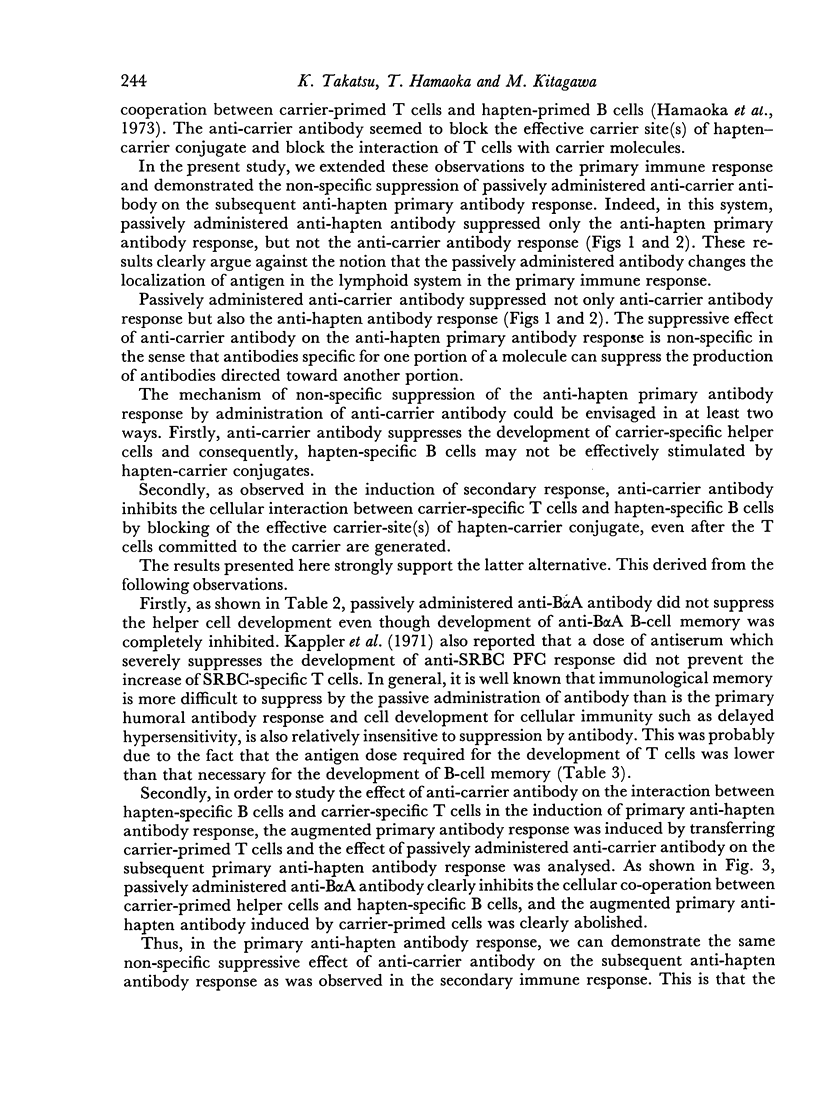
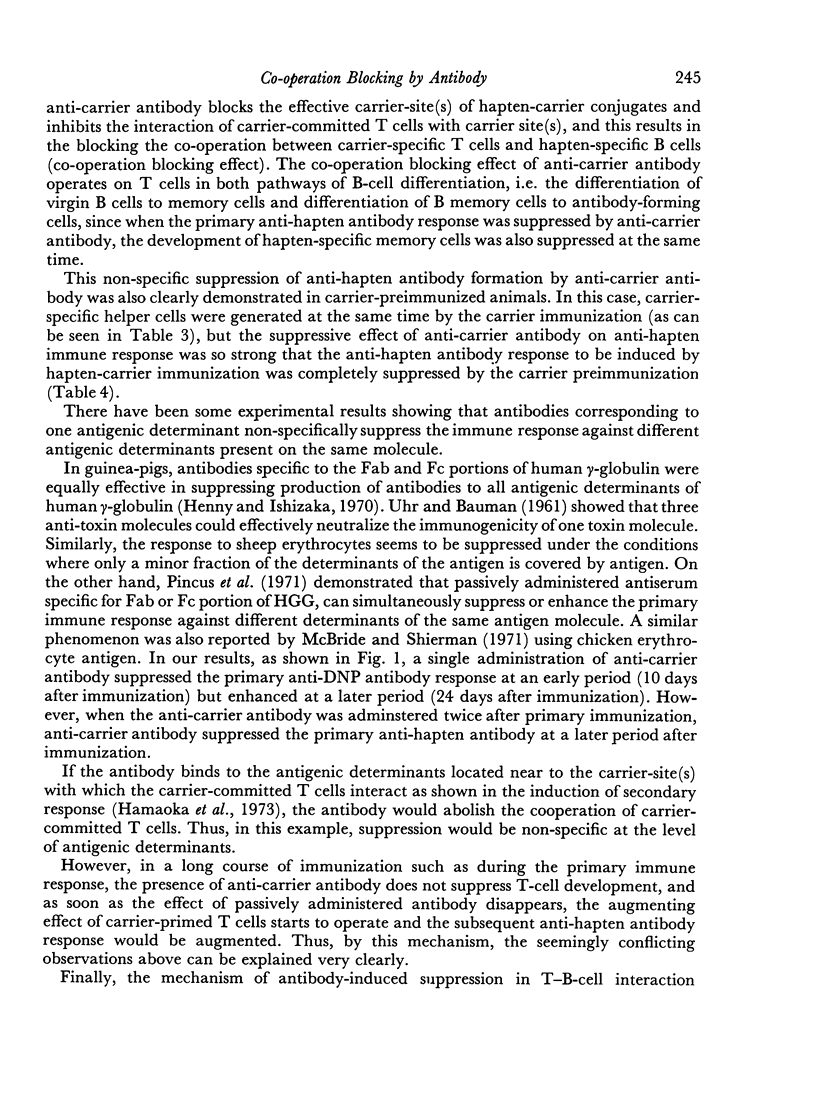
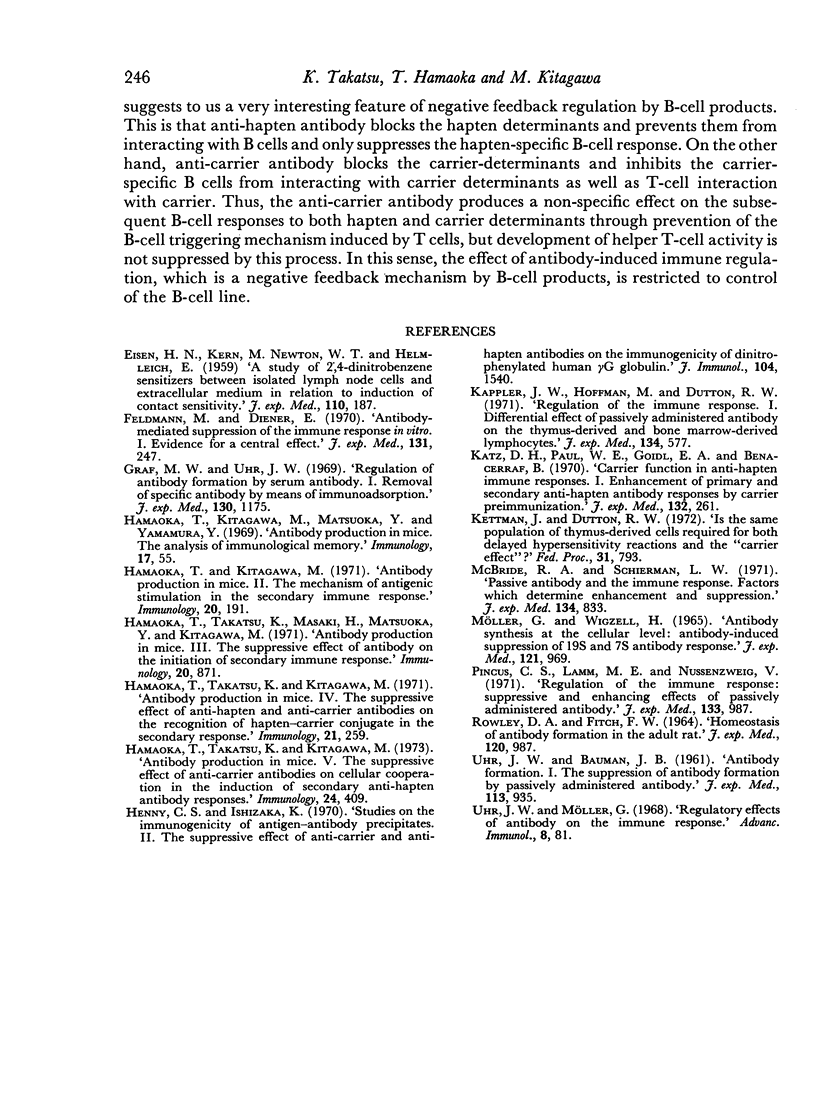
Selected References
These references are in PubMed. This may not be the complete list of references from this article.
- EISEN H. N., KERN M., NEWTON W. T., HELMREICH E. A study of the distribution of 2,4-dinitrobenzene sensitizers between isolated lymph node cells and extracellular medium in relation to induction of contact skin sensitivity. J Exp Med. 1959 Aug 1;110(2):187–206. doi: 10.1084/jem.110.2.187. [DOI] [PMC free article] [PubMed] [Google Scholar]
- Feldmann M., Diener E. Antibody-mediated suppression of the immune response in vitro. I. Evidence for a central effect. J Exp Med. 1970 Feb;131(2):247–274. doi: 10.1084/jem.131.2.247. [DOI] [PMC free article] [PubMed] [Google Scholar]
- Graf M. W., Uhr J. W. Regulation of antibody formation by serum antibody. I. Removal of specific antibody by means of immunoadsorption. J Exp Med. 1969 Nov 1;130(5):1175–1186. doi: 10.1084/jem.130.5.1175. [DOI] [PMC free article] [PubMed] [Google Scholar]
- Hamaoka T., Kitagawa M. Antibody production in mice. II. The mechanism of antigenic stimulation in the secondary immune response. Immunology. 1971 Feb;20(2):191–203. [PMC free article] [PubMed] [Google Scholar]
- Hamaoka T., Kitagawa M., Matsuoka Y., Yamamura Y. Antibody production in mice. I. The analysis of immunological memory. Immunology. 1969 Jul;17(1):55–69. [PMC free article] [PubMed] [Google Scholar]
- Hamaoka T., Takatsu K., Kitagawa M. Antibody production in mice. V. The suppressive effect of anti-carrier antibodies on cellular cooperation in the induction of secondary anti-hapten antibody responses. Immunology. 1973 Mar;24(3):409–424. [PMC free article] [PubMed] [Google Scholar]
- Hamaoka T., Takatsu K., Masaki H., Matsuoka Y., Kitagawa M. Antibody production in mice. 3. The suppressive effect of antibody on the initiation of secondary immune response. Immunology. 1971 Jun;20(6):871–881. [PMC free article] [PubMed] [Google Scholar]
- Henney C. S., Ishizaka K. Studies on the immunogenicity of antigen-antibody precipitates. II. The suppressive effect of anti-carrier and anti-hapten antibodies on the immunogenicity of dinitrophenylated human gamma G globulin. J Immunol. 1970 Jun;104(6):1540–1549. [PubMed] [Google Scholar]
- Kappler J. W., Hoffmann M., Dutton R. W. Regulation of the immune response. I. Differential effect of passively administered antibody on the thymus-derived and bone marrow-derived lymphocytes. J Exp Med. 1971 Sep 1;134(3 Pt 1):577–587. doi: 10.1084/jem.134.3.577. [DOI] [PMC free article] [PubMed] [Google Scholar]
- MOLLER G., WIGZELL H. ANTIBODY SYNTHESIS AT THE CELLULAR LEVEL. ANTIBODY-INDUCED SUPPRESSION OF 19S AND 7S ANTIBODY RESPONSE. J Exp Med. 1965 Jun 1;121:969–989. doi: 10.1084/jem.121.6.969. [DOI] [PMC free article] [PubMed] [Google Scholar]
- McBride R. A., Schierman L. W. Passive antibody and the immune response. Factors which determine enhancement and suppression. J Exp Med. 1971 Oct 1;134(4):833–845. doi: 10.1084/jem.134.4.833. [DOI] [PMC free article] [PubMed] [Google Scholar]
- Pincus C. S., Lamm M. E., Nussenzweig V. Regulation of the immune response: suppressive and enhancing effects of passively administered antibody. J Exp Med. 1971 May 1;133(5):987–1003. doi: 10.1084/jem.133.5.987. [DOI] [PMC free article] [PubMed] [Google Scholar]
- ROWLEY D. A., FITCH F. W. HOMEOSTASIS OF ANTIBODY FORMATION IN THE ADULT RAT. J Exp Med. 1964 Dec 1;120:987–1005. doi: 10.1084/jem.120.6.987. [DOI] [PMC free article] [PubMed] [Google Scholar]
- UHR J. W., BAUMANN J. B. Antibody formation. I. The suppression of antibody formation by passively administered antibody. J Exp Med. 1961 May 1;113:935–957. doi: 10.1084/jem.113.5.935. [DOI] [PMC free article] [PubMed] [Google Scholar]
- Uhr J. W., Möller G. Regulatory effect of antibody on the immune response. Adv Immunol. 1968;8:81–127. doi: 10.1016/s0065-2776(08)60465-4. [DOI] [PubMed] [Google Scholar]


